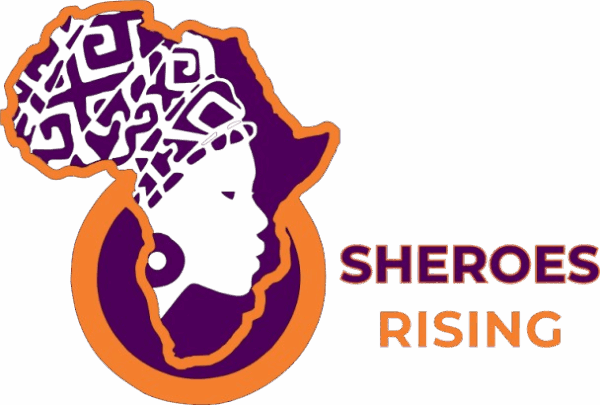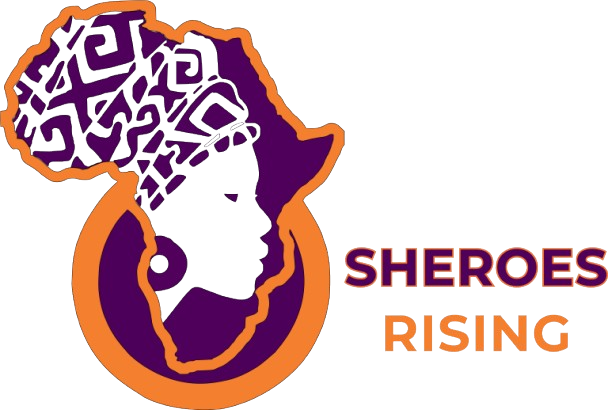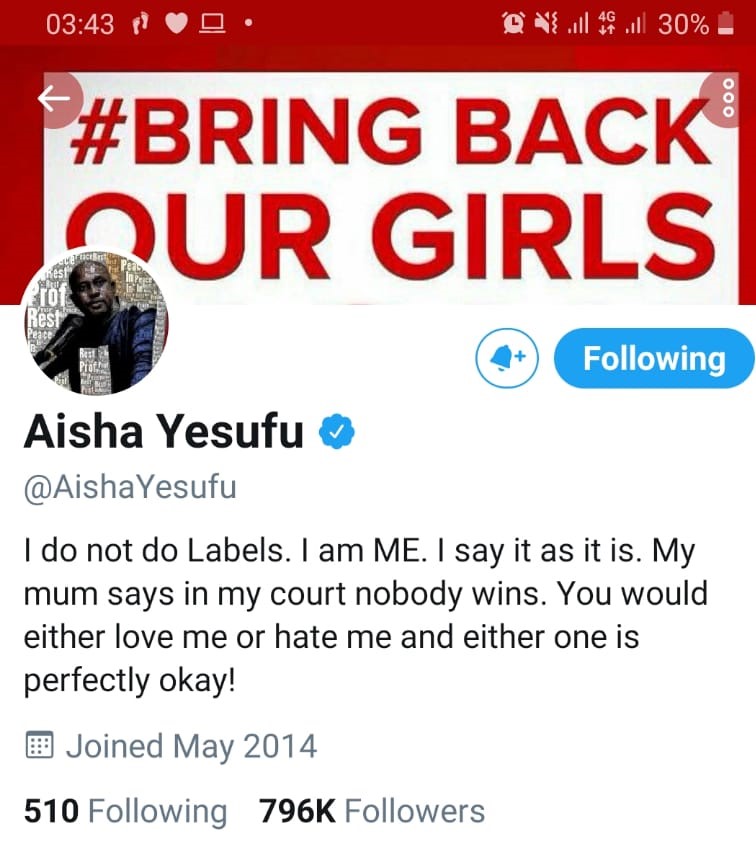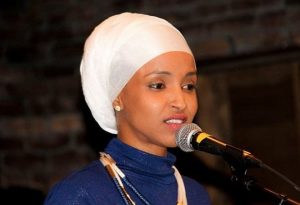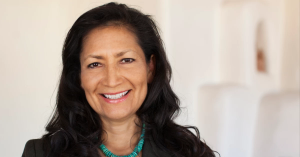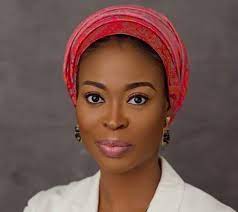She is a businesswoman. Mother. Wife. Activist: Aisha Yesufu
Aisha Yesufu is a successful businesswoman, prominent activist, and social critic. She first came to national prominence during Bring Back Our Girls campaign in 2015, and the recent #ENDSARS movement in 2020.
Her involvement with the campaign against police brutalities once again, brought her into the limelight winning lots of accolades, commendation and praises including being named one of the 2020 most influential women in the world by the BBC.
In this sheroes interview, Aisha Yesufu tells her story, family, business, and activisms.
Sheroes: We would like to know a little about Aisha Yesufu
Aisha: Aisha Yesufu is an active citizen. My parents are originally from Edo state, but I was born and brought up in Kano state, and that was where I had all my primary, secondary and university education. Although I did go to other universities, I never graduated from them. I was a bit sick at Usman Danfodio University, and during my stay at Ahmadu Bello University, the university was shut down for the whole year due to a strike which made me decide to go back to Bayero University Kano where I finally graduated from. I studied Microbiology and I graduated with a Second-Class Upper-division and went on to do a Master’s in pharmaceutical science.
I started my PhD program in 2007 but I never finished. I had issues with my lecturers, so I just left. I am married and I have two children. A boy and a girl. They are all adults now. The first child is 21, will be 22 in March while the youngest clocked is 19 last December. I am married to an amazing human being. He is my mentor and my number one fan. He has always been there for me right from the day we met and started dating. I got married in 1998. In fact, it was my husband who wrote me a letter of encouragement when I was about to venture into business, saying…

“You will be a business woman the world will be proud of”
On being an activist:
Many people think I am an activist, which I am not. I am just an active citizen. I started my business in 2000. He always motivated me, pushed me to aim higher. So, I am a businesswoman, I have never worked in my life and have no intention of working for anybody.
Sheroes: The fact that some people are driven by circumstances to become activists, we want to know what inspired you to be an activist.
Aisha Yesufu: Well, I always speak out against injustice even as a young child. I was unable to speak on national issues because I was working on becoming financially independent due to fact that I experienced poverty when I was a child. My father lost his source of income. My first protest was in 1992 at Usman Danfodio University. Even at Ahmadu Bello University Zaria, I participated in a lot of protests. In Bayero University, people in our block were even afraid of engaging me because they thought I would get them into trouble. I did not spare even the lecturers. As long as you did something wrong, I was not going to keep quiet.
Now, as I was focusing on my financial independence, I realized when I reached the age of forty that I had become the problem of Nigeria. How did I become the problem of Nigeria? It was by my silence. Growing up as a child, I hated poverty, injustice and the way other people were unfairly treated. I turned forty in 2013 and I promised from then on that I would start talking on national issues. I looked at education and women empowerment as my priorities. The most important thing is Chibok Girl abduction happened four months after I turned forty. So, I co-founded Bring Back Our Girl movement.
I heard about the planned march and I was there on the street on the first day, 30th April 2014, and since then Nigeria has always heard me louder. One thing about me is I never take what I am passionate about lightly. Therefore, the first time I started talking on national issues, Nigeria heard me loud.

Sheroes: Growing up as a woman in northern Nigeria is full of challenges for aspiring women like you. Some people may expect you not to make noise, stay at home and look after your kids. In fact, there are gender barriers for women who struggling to make their voices heard. How do you manage to cope with these social stigmas?
Aisha Yesufu: One of the things that really help me in my life is I never considered myself as a girl or as a woman. I only consider myself as a human being who has every right to occupy the space that God has given me. If you go to my Twitter handle, you will see the way I describe myself:
“I do not do labels. I am. Say it as it is. My mom says in my court nobody wins. You would either love me or hate me, and either one, that is perfectly okay.”
So, all my life I have never given in to those who claim I am supposed to act more like a girl. I always shrug off criticisms that as a Muslim woman I am supposed to or not do this and that. A lot of people seem to bring their cultures into Islam, leading many to think they are parts of Islam. I read one twitter rant by a guy who said you I came out to protest and that’s not the way Islam teaches. I replied him that the Islam that I know had woman coming to work with men. In the Battle of Badr, the Prophet Muhammad (SAW) was abandoned by the men who were supposed to be there for him after they thought they were victorious which a trap they fell into. It was women who came to protect him. So, Islam fully supports women to work; besides a hadith has it that “actions are judged according to intention.”
So if you know have a full knowledge of Islam, you don’t need to bother about what other people say. I am very proud to be a Muslim. Everywhere I go in the world I wear my hijab and if there is any country that discriminates against people wearing hijab in the country, then it is a country I am not interested in. Even during the protests, I always ask them to give my Sharia space. So, people fully accept me for who I am. I am Sharia compliant and I see no reason why I can be made not do what the Sharia allows. So, all I know is being a woman does not limit me and Islam has given women rights centuries before the modern concepts of women right that people are fighting for today.
Sheroes: Nigeria is facing so many challenges such as insecurity, poverty, and human rights violations, what do you think we should do surmount all this?
Aisha Yesufu: The first thing we need to invest in is education, education, and education. We have to get people educated beyond getting people into school. We need to reach out to the entire generation teaching what politics, governance and rules of laws are all about. Let them know their rights because a lot of people do not really know their rights. I talked on Twitter that first dictators people encounter in life are actually their parents because they never allow their children to speak up. The children will grow up to enforce the same authoritarian tendencies on their kids, leaving little rooms for them to speak up and question on issues, and have voices.
These are the kinds of people we have in the society today. People also needs to understand the relationship between them and the government is people can make demands of the government that is voted to supply and meet their demands. So, when you are making demands, you are not committing a crime. You are not a wicked person. You are just reminding them of the promises they made during electioneering which they must fulfill. It does not matter whether you voted for them or not; whoever is in power is representing all of us.
So, the citizens must understand this. As for education, the people must understand their rights because the hypocrisy in this country is too much. People are supporting or criticizing a person because he is not from their tribes or religion. People must understand that this country is for all of us. If a section of the country is in bad shape, it can affect the other parts. Nigerians must unite and set aside their differences. The politicians do not like each other but they are united and working for their selfish interests.
Sheroes: You were recently selected as one of the most influential women in the world. How do you feel?
Aisha: I got selected as one the 100 most influential women in the world. I don’t think I am into this activism for recognition. I wish these problems I am fighting for were not even there in the first place. I really appreciate the selection considering there were thousands of other people to be selected. To me, fighting against injustice, police brutalities and fighting for good governance are things I am passionate about and no matter how difficult it is, I will continue to fight for a better Nigeria. I am doing all this for generations unborn the way I wish people had fought for me before I was born. If they had fought for me decades ago, I would not have been doing all this.
Sheroes: Are you being dissuaded by the ongoing crackdowns on activists?
Aisha: Absolutely not. I am always ready for that. I am not dissuaded by threats. To me, death is not about stopping breathing, it is when you cannot speak out against injustice because you are afraid to die.
As a Muslim, I know if I am destined to die, I cannot stop it. I have got a lot of death threats. So, even if I am killed, my voices cannot be silenced because I have recordings and materials that can be accessed when I am gone. Martin Luther King Jr. was killed over 50 years ago, but he is more alive than millions of people breathing today.
No, I cannot be silenced.

